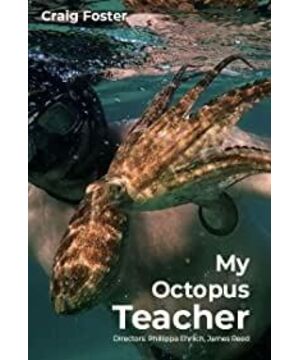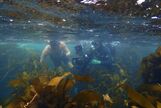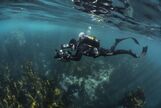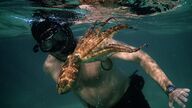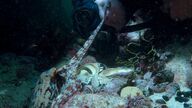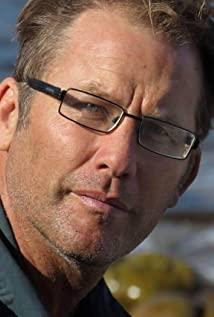Exploring and establishing a connection with nature are the eternal themes of nature documentaries. But "My Teacher Octopus" is not just a nature documentary.
Cinematographer Craig has been through a period of low work for two years. He no longer wants to see the camera and the editing room. The exhaustion and depression even affect the family relationship. Seeing that his son Tom was still young, Craig didn't want to be a "depressed father" in the eyes of his children. He knew he had to change.
Craig remembered his childhood life and the aboriginal people of the Kalahari, so he returned to Cape Storm, South Africa, to the most familiar sea area, and threw himself into the embrace of the sea again. He does not bring an oxygen tank or a wetsuit, and tries to gain strength from the sea by free diving to solve the confusion of life.
In that dangerous sea, in addition to discovering the amazing landscape of another world in the deep sea, Craig also forged a deep "friendship" with an octopus.
This octopus is actually nothing special. It is the most common one among the living beings in the ocean. It travels alone and is careful. If it hadn't happened to be discovered by Craig, it should have existed silently until the end of its short life.
But Craig became interested in it, "Going into the water, there is a sense of freedom, all the worries, troubles in your life are gone. Gradually, you start to care about all animals, even the tiniest of animals. , you realize that every life matters." Craig picked up the camera again.
However, gaining the trust of an octopus is not that easy. In the dangerous sea, it may become prey at any time, so it needs to be vigilant at all times. When the "monster" Craig was first seen, he was hiding in a cave, shoving his liquid body into cracks, ready to escape. When Craig put down the camera and walked away, he tentatively touched the novel object in front of him with his tentacles.
How smart are octopuses? There are about 300 species of octopuses in the world, and most of them live alone on the bottom of the sea. However, unlike many mollusks, they have the ability to learn and remember, and have an IQ equivalent to that of a cat or a dog, or even lower primates.
In this way, the temptation for you to come and go continues until the 26th day. That day, when Craig reached out to the octopus, it also reached out and touched Craig until he climbed up his fists and arms with confidence and daringly, and quietly attached to his chest, like a A docile pet.
As a marine loner, it uses everything at its disposal to protect itself. The game of life and death between it and its natural enemy, the night-robed shark, is full of the cruel laws of nature, and it also shows the powerful instinct of survival, as well as the amazing wisdom in the face of death.
After escaping the danger, this spiritual animal stretched its "eight limbs" when the fish swarmed, and teased the little fish like a naughty child.
In the end, the octopus gave all its energy in order to keep its huge number of eggs alive, and became shriveled and pale, swept out of its burrow by the sea, and became food for other animals.
Perhaps this is the reason why this film is so moving. Craig did not record with the attitude of inspection and research, but "interacted" with the octopus from an equal perspective, not simply photographing the octopus' living habits, but trying to capture it. delicate inner world. The film allows people to see how a small life works hard to live, and how it blooms beautifully in a short time. "That is their strategy, to live a short life happily."
The whole film uses healing blue as its tone, which symbolizes the unknown and mysterious sea, which implies infinite vitality. At the same time, the color of the film also played a certain narrative role. For example, in the scene where the octopus hunts the lobster, the color of the picture is full and bright, but when the shark finally takes the octopus away, the saturation of the picture is reduced and it becomes very dark.
Craig has photographed the hunting activities of local people in the African desert and deeply admires the hunters' ability to integrate into nature. This time, after 325 days, equivalent to one-third of the octopus's life, he found himself in the state he had longed for. He laments that it was the waters that gave him the strength, the "teacher octopus" who taught him how to be a member of nature, "not a visitor."
When Craig is alone in the seaweed jungle, he is not alone, on the contrary, he is like a child, returning to the warm embrace of childhood.
The film is over, and Craig's story continues. He rediscovered the direction of his life and work, and began to share and protect the waters with like-minded people.
View more about My Octopus Teacher reviews


